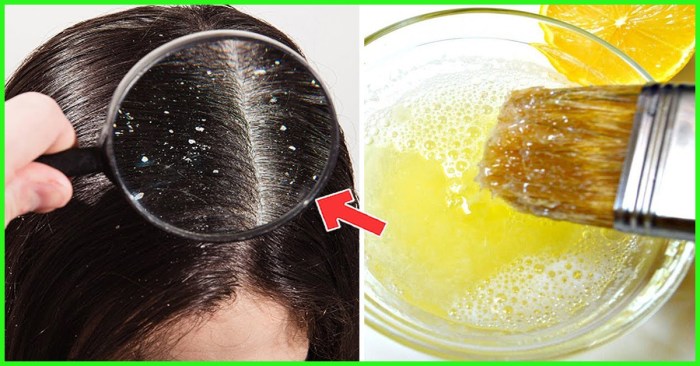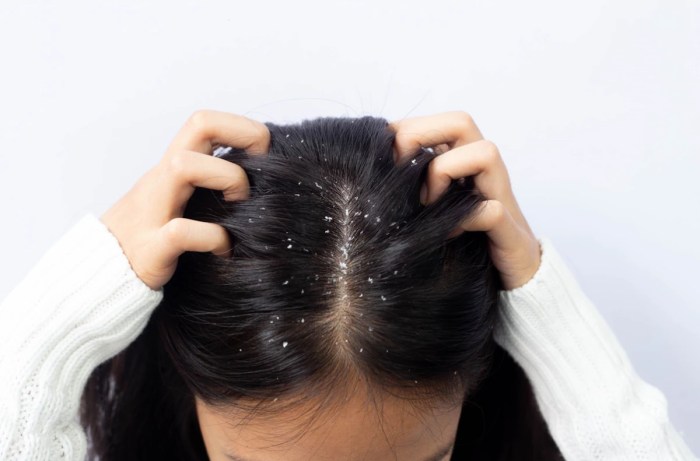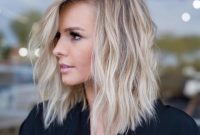Dandruff, a common scalp condition, plagues countless individuals, leaving behind an unsightly trail of white flakes. But what exactly is dandruff, and how can we effectively address it? In this comprehensive guide, we’ll delve into the depths of dandruff, exploring its causes, types, and the arsenal of remedies available to restore scalp health and banish those pesky flakes.
From understanding the role of the Malassezia globosa fungus to delving into the efficacy of home remedies and medical treatments, we’ll empower you with the knowledge and tools to combat dandruff head-on. Whether you’re grappling with dry, oily, or even severe dandruff, we’ll guide you towards a dandruff-free scalp, leaving you with confidence and a renewed sense of scalp serenity.
Definition of Dandruff
Dandruff is a common scalp condition characterized by the shedding of dead skin cells from the scalp. It is caused by an overgrowth of a fungus called Malassezia globosa, which feeds on the oils produced by the scalp.
Common symptoms of dandruff include:
- White or yellowish flakes on the scalp, hair, and shoulders
- Itching and irritation of the scalp
- Redness and scaling of the scalp
Types of Dandruff
Dandruff manifests in different forms, each with distinct characteristics and underlying causes. Understanding these types is crucial for effective treatment.
Dry Dandruff
- Characteristics: Small, white or grayish flakes that fall from the scalp easily.
- Causes: Dry skin, insufficient sebum production, or exposure to harsh weather conditions.
Oily Dandruff
- Characteristics: Large, yellow or greasy flakes that adhere to the scalp.
- Causes: Excessive sebum production, hormonal imbalances, or a yeast-like fungus called Malassezia.
Seborrheic Dermatitis
- Characteristics: Red, scaly patches on the scalp, accompanied by itching and inflammation.
- Causes: An overgrowth of Malassezia, a yeast-like fungus that feeds on scalp oils.
Causes of Dandruff
Dandruff, a common scalp condition, is primarily caused by a combination of factors, including the presence of a fungus, genetic predisposition, dietary choices, and environmental influences.
The most prevalent cause of dandruff is the overgrowth of a fungus called Malassezia globosa . This fungus thrives on the oils produced by the scalp and feeds on them, releasing byproducts that can irritate the skin and cause inflammation.
The resulting irritation leads to the formation of white or yellowish flakes that are characteristic of dandruff.
Genetics
Genetic factors can also play a role in the development of dandruff. Certain individuals may inherit a predisposition to having a scalp that is more susceptible to Malassezia globosa overgrowth or to developing an inflammatory response to the fungus.
Diet
Diet may also influence dandruff. A deficiency in certain nutrients, such as zinc, biotin, and certain B vitamins, has been linked to an increased risk of developing dandruff. These nutrients are essential for maintaining a healthy scalp and hair.
Environmental Factors
Environmental factors, such as stress, hormonal changes, and exposure to certain chemicals, can also contribute to dandruff. Stress can trigger an inflammatory response that worsens dandruff, while hormonal changes, particularly during puberty and menopause, can affect the production of scalp oils and increase the risk of dandruff.
Home Remedies for Dandruff
Dandruff can be an embarrassing and uncomfortable condition, but it can be effectively treated with a variety of home remedies. These remedies are natural, safe, and often very effective.
The most common home remedies for dandruff include:
- Apple cider vinegar: Apple cider vinegar is a natural antifungal and antibacterial agent. It can help to kill the Malassezia globosa fungus that causes dandruff.
- Tea tree oil: Tea tree oil is another natural antifungal and antibacterial agent. It can help to reduce inflammation and itching.
- Baking soda: Baking soda is a natural exfoliant. It can help to remove dead skin cells and excess oil from the scalp.
- Coconut oil: Coconut oil is a natural moisturizer. It can help to soothe the scalp and reduce itching.
- Lemon juice: Lemon juice is a natural astringent. It can help to reduce oil production and prevent dandruff.
Medical Treatments for Dandruff

When home remedies fail to provide relief from dandruff, medical treatments can offer effective solutions. These treatments target the underlying causes of dandruff, addressing the overgrowth of Malassezia globosa, inflammation, and scalp dryness.
Topical Antifungal Medications
Topical antifungal medications, such as ketoconazole, selenium sulfide, and ciclopirox, are commonly prescribed to combat the Malassezia globosa fungus. These medications work by inhibiting the growth of the fungus, reducing the production of irritating substances that cause dandruff.
Topical Corticosteroids
Topical corticosteroids, such as hydrocortisone and clobetasol, are effective in reducing inflammation and itching associated with dandruff. They work by suppressing the immune system’s response to the irritants produced by Malassezia globosa.
Anti-Inflammatory Shampoos
Anti-inflammatory shampoos contain ingredients such as zinc pyrithione, coal tar, or salicylic acid that help reduce inflammation and scalp irritation. These shampoos can be used regularly to manage mild to moderate dandruff.
Oral Antifungal Medications
In severe cases of dandruff, oral antifungal medications, such as fluconazole and itraconazole, may be prescribed. These medications are taken orally and work by inhibiting the growth of Malassezia globosa throughout the body.
Choosing the Appropriate Treatment
The choice of medical treatment for dandruff depends on the type and severity of the condition. Mild dandruff can often be managed with topical antifungal shampoos or anti-inflammatory shampoos. More severe cases may require prescription-strength topical or oral medications.
Prevention of Dandruff
Adopting preventive measures can significantly reduce the risk of developing dandruff. By addressing lifestyle factors and implementing proper hair care practices, individuals can create a dandruff-free scalp environment.
Proper Hair Care
Maintaining a healthy scalp requires proper hair care habits. Regular shampooing with a dandruff-specific shampoo can help remove excess oil, dead skin cells, and product buildup that contribute to dandruff. Additionally, avoiding harsh hair products and excessive heat styling can prevent scalp irritation and inflammation.
Stress Management
Stress can trigger dandruff by stimulating the production of scalp oils. Implementing stress management techniques, such as exercise, yoga, or meditation, can help reduce stress levels and minimize the risk of dandruff.
Diet
A balanced diet rich in vitamins and minerals can support scalp health. Consuming foods high in zinc, B vitamins, and omega-3 fatty acids can help maintain a healthy scalp and prevent dandruff.
Hair Care Products for Dandruff

Dandruff-specific hair care products can effectively manage and alleviate dandruff symptoms. These products contain ingredients that target the underlying causes of dandruff, such as Malassezia overgrowth and scalp dryness.
Types of Hair Care Products for Dandruff
Various types of hair care products are available to treat dandruff, including:
Anti-fungal shampoos
Contain ingredients like ketoconazole, selenium sulfide, and ciclopirox, which combat Malassezia growth.
Moisturizing shampoos and conditioners
Enriched with humectants like glycerin, panthenol, and ceramides, these products hydrate the scalp, reducing dryness and flakiness.
Exfoliating shampoos
Contain ingredients like salicylic acid and zinc pyrithione, which help remove dead skin cells and excess sebum, preventing buildup.
Choosing the Right Products
The best hair care products for dandruff depend on individual needs and scalp conditions. Consider the following factors when selecting products:
Severity of dandruff
Mild dandruff may respond well to over-the-counter products, while severe cases may require prescription-strength treatments.
Scalp sensitivity
Some products may cause irritation, so choose gentle formulas if you have sensitive skin.
Hair type
Consider the texture and porosity of your hair when choosing products, as some may weigh down fine hair or leave dry hair feeling brittle.
Ingredients
Pay attention to the active ingredients in products and select those that target your specific dandruff concerns.
Recommended Products
Below is a table comparing the ingredients and effectiveness of different hair care products for dandruff:| Product | Active Ingredients | Effectiveness ||—|—|—|| Nizoral A-D Anti-Dandruff Shampoo | Ketoconazole | Highly effective against Malassezia || Head & Shoulders Clinical Solutions Anti-Dandruff Shampoo | Selenium sulfide | Moderate effectiveness, good for mild to moderate dandruff || Aveeno Scalp Soothing Oatmeal Shampoo | Colloidal oatmeal, salicylic acid | Gentle, moisturizing, effective for mild dandruff || Neutrogena T/Gel Anti-Dandruff Shampoo | Coal tar | Effective for severe dandruff, but can be harsh || L’Oréal Paris EverPure Scalp Care + Detox Sulfate Free Shampoo | Piroctone olamine, salicylic acid | Gentle, effective for sensitive scalps |
Case Studies and Testimonials

Reading about the experiences of others who have successfully treated dandruff can provide valuable insights and inspiration. Here are some case studies and testimonials from individuals who have found effective solutions for their dandruff problem.
Case studies offer a detailed examination of an individual’s journey in overcoming dandruff, providing a comprehensive understanding of the challenges faced and the treatments that proved successful. Testimonials, on the other hand, offer brief accounts of positive experiences with specific treatments or remedies.
Case Study: Successful Treatment of Severe Dandruff
A 35-year-old male with a history of severe dandruff experienced persistent flaking, itching, and scalp irritation. After trying various over-the-counter shampoos and home remedies without significant improvement, he consulted a dermatologist.
The dermatologist diagnosed the patient with seborrheic dermatitis, a common form of dandruff caused by an overgrowth of a fungus on the scalp. The patient was prescribed a topical antifungal shampoo and a medicated scalp lotion.
Within a few weeks of using the prescribed treatments, the patient’s dandruff symptoms began to subside. The flaking and itching gradually decreased, and his scalp irritation improved significantly. After several months of consistent use, the patient’s dandruff was completely resolved.
Testimonial: Relief from Itching and Flaking
“I had been struggling with dandruff for years, and it was driving me crazy. The itching and flaking were constant, and I was so embarrassed about it. I tried everything I could find, but nothing seemed to work.”
“Finally, I decided to give a coal tar shampoo a try. I was skeptical at first, but I was desperate. To my surprise, it worked! Within a few weeks, the itching and flaking were gone. I’ve been using the shampoo for a few months now, and I haven’t had any dandruff since.”
Outcome Summary
In the battle against dandruff, knowledge is your most potent weapon. By comprehending the underlying causes and exploring the diverse treatment options, you can effectively reclaim scalp health. Remember, a healthy scalp is not just about aesthetics; it’s about regaining confidence and embracing a life free from the embarrassment and discomfort of dandruff.
Embrace the tips and remedies Artikeld in this guide, and let your scalp bask in the freedom of being dandruff-free.
FAQs
What causes dandruff?
Dandruff is primarily caused by an overgrowth of the Malassezia globosa fungus, which feeds on scalp oils and produces oleic acid, an irritant that triggers inflammation and flaking.
Can stress contribute to dandruff?
Yes, stress can exacerbate dandruff by weakening the immune system, making the scalp more susceptible to fungal overgrowth and inflammation.
Is dandruff contagious?
No, dandruff is not contagious. It is caused by an overgrowth of a fungus that is naturally present on the scalp.
Can dandruff be cured?
While dandruff cannot be completely cured, it can be effectively managed with regular use of anti-dandruff shampoos, topical treatments, and lifestyle modifications.



